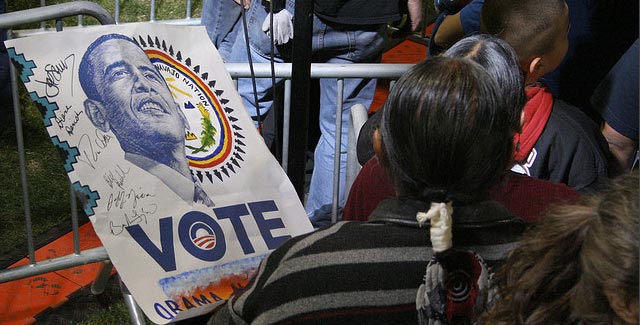
Back in session and gearing up for campaigns before the November midterm elections, the political coverage will likely focus on two aspects of a Congressional race: who will win and who will vote.
We can look forward to more fill-in-the-blank, predictable reporting. It usually goes like this: Will this candidate win? And will women, Latinos, blacks, labor, the Tea Party or youth turn out to vote for the candidate?
Yet in this year’s election campaign, one crucial voting bloc that is slowly gaining attention for its role in key races is the Native American vote. Particularly in close contests in Western states, the Native vote can swing a victory one way or another.
For many political pundits, the Native voting bloc is also one of the least understood, or perhaps the least appreciated.But as Native Americans gain a larger voice politically, the issues important to this group should also gain more attention by those in Congress.
It makes sense that the Native vote has not attracted the scrutiny of the political establishment so far. Even as recently as the 2010 census, Native Americans comprise 5.2 million of the country’s 308 million people. These numbers, especially when divided among the 50 states, would seem to dilute their political impact on elections. However, especially in states with high concentrations of Native voters, the impact of this constituency on elections is palpable.
Even more than numbers, you can look to history for the lack of attention to Native issues and Native voters. For decades, many Americans viewed Native Americans as a relic of the past (or as sports mascots). Natives were not considered citizens – and thus could not vote in elections – until 1924, just 90 years ago. It was not until 1948 that Natives could vote in every state. By the time Natives could vote most of the United States already viewed Indians as a people of the past. If Indians were not viewed as part of modern America how can they influence modern American politics? Where people did recognize the existence of Natives, the reality of poverty, small numbers of registered voters or lack of political influence, resulted in a political environment where these votes were largely ignored.
Still, over the last 15 years, Natives have developed their economies, registered voters and engaged more fully in the political and policy process. The results have been dramatic.
In some Western states, the Native vote can decide the outcome of an election. Just ask former Sen. Slade Gorton (R-Washington). In 2000, he was unseated by Sen. Maria Cantwell (D-Washington) in part because tribes viewed Gorton as so anti-tribal that they decided to unite against him.
Since then, tribes and political parties have slowly and quietly engaged Natives in tight races to support pro-tribal candidates. Sen. Jon Tester (D-Montana) may owe his two terms in the Senate to tribal communities. Sen. Lisa Murkowski’s (R-Alaska) historic write-in campaign during the general election largely was the result of Native voters who were fearful of what Republican candidate Joe Miller’s vote would bring to their communities. Sen. Heidi Heitkamp (D-Washington) also focused on Native turnout for her successful election.
This year, Sen. Mark Begich (D-Alaska) implemented a massive voter turnout machine across thousands of miles focused on Natives who live in isolated villages.
Both parties are learning the Native vote is not partisan. The two tribal citizens serving in the House are both Republicans: Reps. Tom Cole (R-Oklahoma) and Markwayne Mullin (R-Oklahoma).
Many who may vote for Begich will also likely vote for Rep. Don Young (R-Alaska), the dean of the Republican conference in the House. The National Republican Senatorial Committee appointed Murkowski to lead outreach to tribal communities, and Cole leads a similar effort for House Republicans.
To be sure, more campaigns and party operatives understand the importance of the Native vote, but it is questionable if the broader political establishment and political media truly understands and appreciates the impact the Native vote has had on federal elections since 2000.
As more and more Native Americans vote, particularly in key races, politicians must engage on these issues at a policy level, not only when they are asking for votes. Native issues can no longer be an ancillary product of Congress, but must be addressed regularly and with meaning.
Some have done so. In recent years, such attention has resulted in more funding for the Indian Health Service, the resolution of major suits against the United States, inclusion in high-profile laws such as the Violence Against Women Act and the Affordable Care Act, and more authority for Natives to govern their communities.
However, the need in these communities is so great that significant work remains to be done. As Congress works to address the difficult issues in our nation, tribal issues must be a priority.
Tribes and Native Americans have a unique relationship with the United States, one that is recognized by – not created by – the Constitution. These communities also have some of the greatest needs for health care, jobs and economic development.
If Congress is unable to always do the right thing for the right reasons, tribes are at least learning that politicians may do the right thing when their job depends on it. For more and more officials, their jobs do depend on it – and Congress and the media are paying closer attention.
Join us in defending the truth before it’s too late
The future of independent journalism is uncertain, and the consequences of losing it are too grave to ignore. To ensure Truthout remains safe, strong, and free, we need to raise $50,000 in the next 9 days. Every dollar raised goes directly toward the costs of producing news you can trust.
Please give what you can — because by supporting us with a tax-deductible donation, you’re not just preserving a source of news, you’re helping to safeguard what’s left of our democracy.